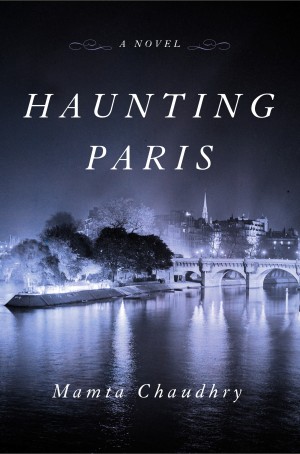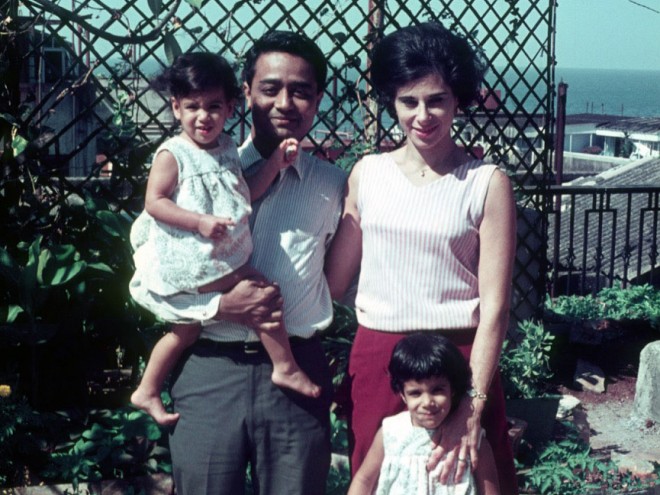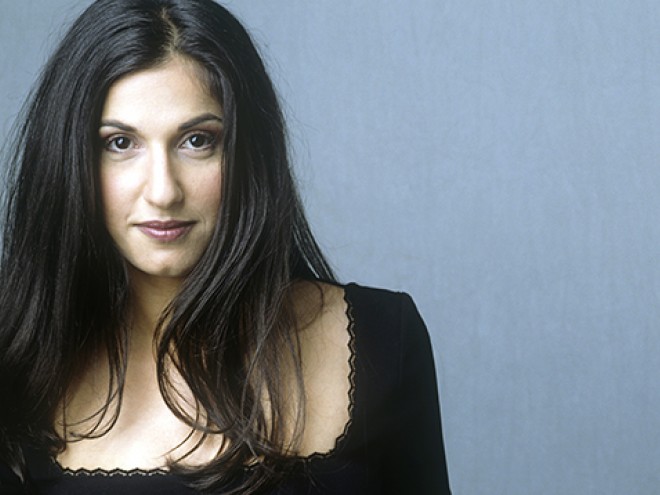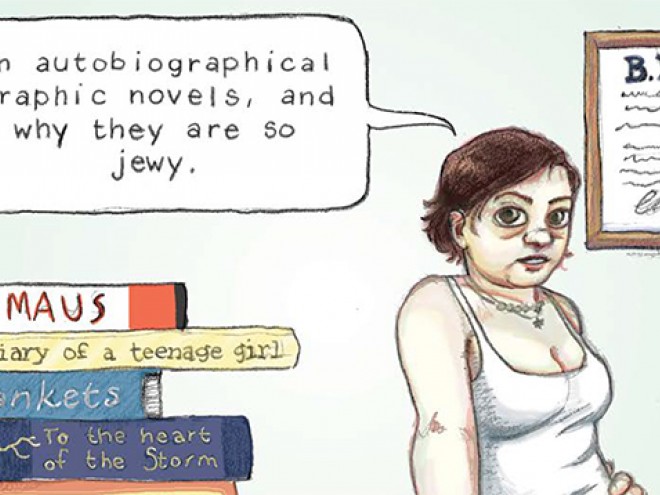
Nocturnal Paris. Rue de Venis by Constant Korovin. 1935. Owner N.L. Okunev.
JBC program associate Michelle Zaurov talks with author Mamta Chaudhry about memory, place, belonging, and the Holocaust. Chaudhry’s book, Haunting Paris: A Novel, is an elegant and probing exploration of love, resilience, and the role of memory — of a country and of a loved one.
Michelle Zaurov: Tell me a bit about what prompted you to write this book. Why the Holocaust?
Mamta Chaudhry: This is a question I get asked a lot because I’m neither French nor Jewish, neither man nor ghost. How I came to write this is as mystifying to me as it is to you. I grew up in Calcutta, I live in Miami, and I’ve written about both. I didn’t set out to write about Paris and certainly not from this perspective. But you don’t always choose your stories, sometimes they come looking for you. I spent a great deal of time in Paris and I wanted to write something set in the city that was really light and fun — essentially a love letter to the city of music, art, and light. But a friend of mine in Miami had lived in Paris, and she told me that I had to visit the Deportation Memorial. It’s behind Notre Dame, which soars up into the sky and this memorial sinks down into the earth. There was a bronze circle chiseled with the words “they went to the end of the earth, and they did not return” and my hair rose as I remembered the French word for ghost: revenant, one who returns. That became the first line in my book: “They call us revenants, those who return.” I heard this voice and I was compelled to follow it wherever it took me and that was the voice of Julien, the ghost.
MZ: How did you go about researching and gathering historical facts?
MC: It was a gift to me that I met people in Paris who had actually experienced this. For example, I went to the Shoah memorial to do research in its archives, and talk to the archivist and librarian who recommended books about the mass roundups of the Jews in Paris in 1942. As I was reading a book they recommended, an elderly gentleman came in and sat across the table from me. He had the saddest eyes I’ve ever seen and I asked him, “Are you doing research, too?” “No,” he said “Témoignage,” which is French for testimony. He was there to give testimony about that time and he looked at the book that I was reading, pointed to it, and said, “that, I know.” I was absolutely speechless because this was just research to me, and it was a lived life to him. I asked him, “Isn’t it hard for you to recall that time, even in retrospect?” He told me that it’s very hard, but necessary. And that’s when I knew I had to tell this story — there were a lot of people who didn’t want to or couldn’t tell it. When you’re given a story to tell, whether it’s yours or not, you want to do it justice. That’s what’s really important. When I wrote it, I thought I was writing about a time in history that was truly in the past, and now I see ominous signs that make me think it’s more important than ever that people should know about this.
MZ: Do you think that writing this book made you more aware of the Jewish plight and trauma back then and even the fear of antisemitism now?
MC: It certainly did. Since I’m Indian, I am a foreigner when I go to Paris and, obviously, I had not experienced antisemitism. But I have Jewish friends who ask, “Oh, isn’t Paris antisemitic?” In researching this book, I realized how long that history is. Something that the Auschwitz museum said which I found really pertinent was that the Holocaust didn’t start with the gas chambers, it started with language and dehumanizing people. When you call people vermin, rats, cockroaches, you make it seem okay for them to be exterminated. It goes back much deeper than just its most horrifying manifestation. I guess this is also a project to educate people — of course, everybody knows about the Holocaust, but there are people who may not have a very clear idea. Someone told me, “I knew what happened. I knew they were rounded up, but I did not feel it in this visceral way.” That’s something that literature can do that journalism, perhaps, is unable to because it doesn’t take you into the lives and minds of people the way literature does.
MZ: What I love about your book is the way you wrote somewhat of a love letter to Paris, yet you expressed such a deep criticism of not only its past but also the people’s collective amnesia about it. Did you feel as though after writing this book and learning all that you did, it tainted your conception of Paris?
MC: It showed me the dark underside of the City of Light. I think that’s true of any place as you learn more about its history — it’s always accompanied by a shadow. My novel is a love letter to Paris, the kind of love that is deep, rich and profound — but also involves heartbreak and betrayal. It was such a betrayal for Julien that the city he thought of as home would turn on him in that way, but he still didn’t stop loving the city. It’s neither my city nor my betrayal, but this is the story of history in many countries and eras. I learned so much in the research, but in the end, I had to put it all aside. I wanted to write it as someone who’s experienced it and not shoehorn in all the information I learned unless it fit. There’s a book about film editing and it says that even when you cut things out, somehow traces remain in what is left, and I feel that way about writing. You can cut out a lot of the ancillary stuff, but because you’ve done the research, it’s still there giving weight to what remains.
MZ: Is Julien’s story based on anyone else’s life or is his narrative something you created?
MC: A lot of people have a whole idea for a story — they just have it in their mind from the first sentence to the last. How I wish I were one of those people! Where I begin is with either an image that I can’t get out of my mind, or a snatch of conversation that I’ve heard, or something that I become obsessed with that I can’t stop thinking about. In this case, I was walking around by the river and I heard a bit of music drifting down from a lighted window. I couldn’t see who was playing the piano, but I got this glimpse of a man leaning forward listening very intently to the music, and I couldn’t shake that image. That little moment created a thread that I followed all the way to the end of the story. I thought, ‘what would be so strong to draw someone back to this world?’ That’s how I got the idea for Julien. During my research, I met my friend’s relatives for tea in Paris, and one was a young girl during the Nazi occupation who escaped the roundups while the rest of her family did not. Her son wrote a beautiful memoir about the family, which he gave me to read. It doesn’t have to do with Julien but some of the things I got from the book applied to Julien’s father’s profession: he was a furrier. I had spent some time in Alsace, probably the oldest Jewish community in France, and that also worked its way in. I’m like a magpie, I’ll find anything and bring it back to the nest and sit there and worry over it until I can figure out a way to use it or to transform it in some way.
MZ: Why did you decide to make Julien’s character dead yet still have a voice in the book?
MC: I was a radio announcer for many years, which gave me the experience of going out as a disembodied voice into corners of cities that I would never have gone to otherwise, or inside homes that I would never have visited. This reminded me of a freedom that allows you to know much more than you could know physically, which Julien possesses since he is able to be in the present and travel back in time to be absorbed into moments in the past. I also think that sense of yearning and wanting to return to this world was important to the whole notion of the book — that he had unfinished business which drew him back. If he were alive, then it wouldn’t be unfinished business, he could still pursue it. A question I get asked a lot is whether I believe in ghosts. Of course I don’t. Yet, when you’re in Paris or any other city that’s old and redolent of history, you can’t help but feel that ghosts are all around you. When I think about any history or place or life, who can know it totally? Everything is a mystery, even the people we love; there’s a mystery at the core of whatever stories we tell about them or what know about them. I like to think that only its ghosts know Paris.
MZ: Now that you said that, I realize that each character is inquisitive about one another in some way. Sylvie is not only curious about Julien’s life, but also that of his ex-wife, Isabelle’s, and Will’s character is intrigued by Sylvie. There’s this circle of people wondering about each other and feeling mystified by everyone else.
MC: Yes, that’s true, and it’s similar to how we are in real life. We’re quick to slap labels on people, like Isabelle who thought of Sylvie as just a common young girl, when in fact she had a richness of life and compassion that Isabelle could never comprehend. The Americans in Paris are interesting because it’s a subversion of the common “American in Paris” story — the American going there, having this transformative experience and making Paris just become a background. I wanted it to be so that the Americans are a background for the story about the Parisians, because their lives will go on when the outsiders leave, the Americans are not central to their life in any way. Will is intrigued by Sylvie because he thinks that if he gets to know her, he’ll get to know the city. So, you’re absolutely right about each character just wondering about the other and not fully knowing them but still reaching for an understanding.
MZ: In one passage, Julien was walking around and said: “Those glowing lights are like the unwinking gaze of history, before which I lower my eyes, ashamed that so many of my countrymen thought a moral reckoning with our own culpability would tear us apart and chose amnesia instead.” Is this a critique of people’s memory with tragedy and their accountability?
MC: Yes, absolutely. I think that what Julien was feeling about avoiding that moral reckoning was that silence is a kind of complicity. I’ve often wondered this about myself, would I have the courage to be the lone voice in the room to speak up when I know something is wrong? We try too hard to believe, as the French did, that it’s all in the past, that it’ll tear the country apart if we go back and deal with it, that it’s more important to move forward and heal. Even when you’re healing, it is still there underneath and it splits apart at moments of stress. If you don’t deal with it, then it festers, and it will bubble to the surface again. The French are so proud of their motto: liberty, equality, fraternity. Was there liberty and equality in 1942? No there wasn’t. So that’s what I was talking about with amnesia — they wanted to forget.
MZ: Do you feel as though your Indian roots play any role in writing this book?
MC: I was born and brought up in Calcutta, so it’s in me, and you can’t help but take yourself wherever you are. One specific way that I connect my Indian roots to this is when Britain left, India was partitioned into two countries: India and Pakistan. My parents were Indian, specifically Punjabi and lived in the part of Punjab which became Pakistan, and this overnight division made them foreigners living in internal exile in their own country. That’s something that stuck with me, especially when I was writing about people who thought they were French their entire lives and suddenly had their citizenship revoked. You are where you think you belong, and then suddenly you no longer belong. I don’t know that I could have written this if I had always lived in India and didn’t gain this outsider perspective from living in another country.
MZ: It seems like the experience of having a few places you call home really manifested in this book since you include several different perspectives and narrative voices.
MC: It absolutely has, since I have been exposed to different voices and tongues everywhere. One of the things that really affected my writing is my passion for classical music. I don’t have a shred of musical talent, but I was a radio announcer for a classical music station. I spent my days just listening to music, being absorbed in it, and that has to do a lot with the voices, too. You can’t have this mishmash where every instrument sounds the same. That influenced my decision to have my characters’ voices be distinct. For instance, the concierge, Ana Carvalho, sounds very different from Isabelle because clearly their station in life and class are reflected in the way that they speak.
MZ: What are you working on now?
MC: I’m working on another manuscript and the only thing I can tell you is that it’s very different from Haunting Paris. I’m also trying to devote some time getting my book out in the world. I’m grateful for all the readers who have responded so profoundly and so perceptively to it, and I’m hoping it will make its way into the hands of more readers.
Michelle Zaurov is Jewish Book Council’s program associate. She graduated from Binghamton University in New York, where she studied English and literature. She has worked as a journalist writing for the Home Reporter, a local Brooklyn publication. She enjoys reading realistic fiction and fantasy novels, especially with a strong female lead.



